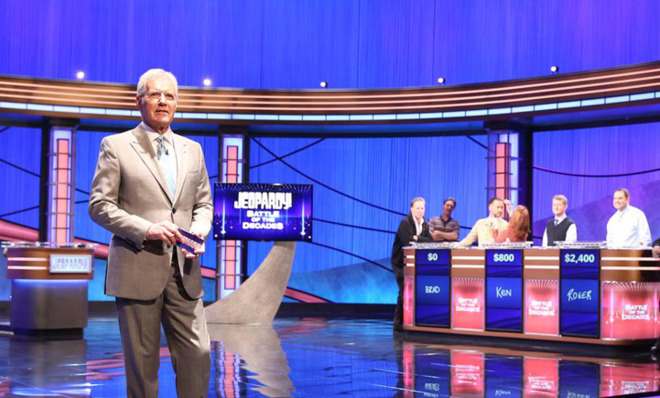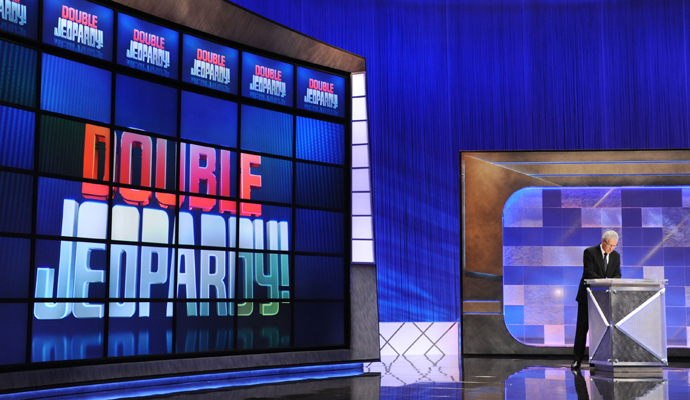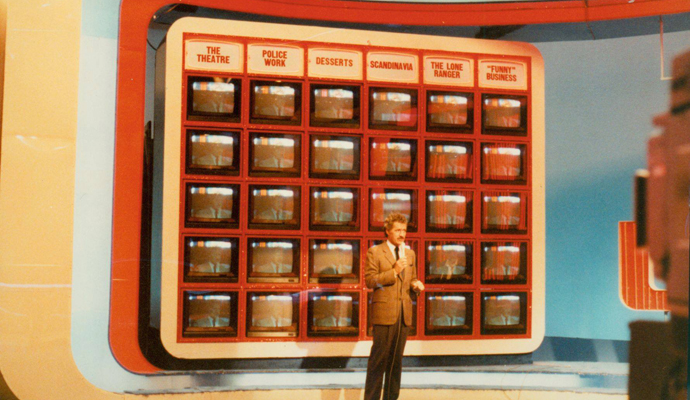Alex Trebek: The last great game-show host
Trebek has by now done more than 6,000 shows. He is a TV star who presides over an assembly line.

A free daily email with the biggest news stories of the day – and the best features from TheWeek.com
You are now subscribed
Your newsletter sign-up was successful
THE SET OF Jeopardy! was given a shiny makeover last year, in preparation for the quiz show's 50th birthday. The new look features that familiar, top-heavy, bubble-letter logo and a gorgeously tacky sunset backdrop that provides an odd companion to the sexless blue-and-white board. In fluorescent spirit, though, the set is unchanged since the 1980s, much like the program itself.
Contestants come and go. Some, like this year's star, Arthur Chu, even briefly become big deals. But it is Alex Trebek who has remained the centerpiece. His extended tenure as America's senior-most faculty member has made Americans forget that he's playing a part; a few years ago, Trebek was voted the eighth-most-trusted person in the United States, sandwiched between Bill and Melinda Gates.
"He's like a Ward Cleaver figure," says Ken Jennings, the most successful Jeopardy! contestant ever. "But for the past 30 years." This month, in fact, the host will mark three decades as the face and voice of Jeopardy!; like the show's theme music, he is almost post-iconic, such a known entity that he's just there.
The Week
Escape your echo chamber. Get the facts behind the news, plus analysis from multiple perspectives.

Sign up for The Week's Free Newsletters
From our morning news briefing to a weekly Good News Newsletter, get the best of The Week delivered directly to your inbox.
From our morning news briefing to a weekly Good News Newsletter, get the best of The Week delivered directly to your inbox.
He might not be there for much longer, though. Jeopardy! continues to draw around 25 million viewers per week, making it second among syndicated game shows (behind only Wheel of Fortune, which Jeopardy! fans dismiss as little better than a televised jumble puzzle). But Trebek has hinted that he will retire when his contract runs out in 2016. Already he has outlasted Jay Leno and now David Letterman as one of the final one-man TV brands from the time before DVRs.
Audience shares and attention spans, however, aren't the only things that have changed during his run. In the internet era, knowing a little about a lot provides diminished cachet: You don't have to retain facts when they can just be Googled. These days there's a throwback charm to the whole Jeopardy! enterprise and the appeal, in Trebek's late-career performances, of a simple job well done.
Trebek has by now done more than 6,000 shows, read out who-knows-how-many facts. Fact after fact after fact. He is a TV star who presides over an assembly line.
But a funny thing about the audiences at Jeopardy! tapings: The faithful pilgrims who've come to see what it all is like in person — most don't actually look directly at Trebek. As a loping brontosaurus of a camera records the action for broadcast, it also pipes footage onto two jumbo screens that face the audience. It's those monitors that the crowd members keep their eyes locked on, not the man below. Mediated Trebek is the Trebek they are comfortable with, the one they reflexively watch. The real Trebek does not mind that.
A free daily email with the biggest news stories of the day – and the best features from TheWeek.com

TREBEK HAS BUILT his career on an air of erudition. But offscreen he is equally invested in a second persona, one that colleagues say has emerged more in recent years. This other Trebek is "much less of a Masterpiece Theater guy," is how a staffer puts it. "He's more of a getting-his-hands-dirty guy."
So even as Trebek might casually draw the solar system during conversation — because of course that's a thing the host of Jeopardy! would do — he also takes pride in noting that he was almost kicked out of boarding school as a boy. He sometimes brags about his breakfast of Snickers and Diet Pepsi. He has had two heart attacks but sums up his current exercise regimen as "I drink." Yes, Trebek can describe for you the 1928 Mouton that he once tasted. But, he is quick to joke, "I'm not a true wine connoisseur. I'm just a drinker."
Fact, according to Trebek: His favorite place in Los Angeles these days is Home Depot. He and his second wife, Jean, whom Trebek married in 1990 when she was 26 and he was a 49-year-old divorcé, live in a nice house in the Valley, and he spends a great deal of time thinking about maintenance and improvements. Trebek says that when he gets up in the middle of the night — he has terrible insomnia — he will lie awake for hours plotting how to fix the sliver of light peeking through his window, and all the other home-repair projects he wants to tackle next.
Trebek grew up in Sudbury, Ontario. During his college days at the University of Ottawa, he held down jobs at both a local radio and TV station, scrambling around town to avoid missing classes or shifts. He got his start as a host in 1963, when he was cast to emcee a Canadian program called Music Hop. He was 33 when he moved to Hollywood to helm The Wizard of Odds on NBC. Clips of his early work show a natural performer. All elements of the singular Trebekian delivery — crisp enunciation, acrobatic inflections, hammy dignity — are there, along with a not-yet-faded accent.
WHEN JEOPARDY! HIRED Trebek as host in 1984, the franchise was emerging from nearly a decade off the air. The show had been the creation of Julann Griffin, wife of game-show impresario Merv Griffin, who dreamed up the format while quiz shows were recovering from the 1950s cheating scandals at The $64,000 Question and Twenty-One. Her insight was that the game could not appear to be rigged if you went ahead and gave the answers to the contestants and asked them to supply the questions instead. Trebek added to that his showman's knack for drawing out contenders and filling silences with easy patter. He quickly propelled Jeopardy! to a level of popularity never achieved under his now-forgotten predecessor. (The correct response to a very hard final round clue would be "Who is Art Fleming?")
In their early years, quiz shows were a platform for striving immigrants to show themselves as the intellectual equals of establishment WASPs, or at least gain some recognition for their smarts. Jeopardy! came out of that tradition, and as mass culture coarsened, it stood as an archipelago of aspirational dweebiness in a sea of hair-metal music videos and prime-time soaps. But if Jeopardy! once stood athwart history yelling, "Stop!" — and rewarded those able to recall who originally coined that phrase — there is plenty of fodder for declinists in the gradual devolution of what the show considers cultural literacy.
Today's games feature far fewer questions in subjects like philosophy or classical music, statistically the most difficult categories. A recent Time study plumbing the trove of Jeopardy! data maintained on a fansite called J-Archive showed that references to Albert Einstein peaked 15 years ago; newer episodes reference Justin Bieber more than twice as often. During the tapings I watched, there was a question about twerking, which Miley Cyrus had just weeks earlier brought into the Baby Boomer vernacular via her performance at the Video Music Awards.
No contestant got a question about Samuel Coleridge correct, which might have been less noteworthy if they hadn't been so quick to buzz in with "Who is Dan Brown?" on the clue directly preceding it. A recent category — "It's a Rap" — required Trebek to spit verse: "Ain't. Nuthin'. But. A. Gee. Thang," he gamely recited, his diction as sharp-cornered as ever. It was funny.
According to head writer Billy Wisse, Jeopardy! is merely adjusting along with the evolving canon. His team needs to write the games so that contestants will still have a shot at knowing the answers; just as important, they have to ensure that the people playing along at home still get to feel good about their intellects. "They don't know as much about Theodore Dreiser as they used to," Wisse said. "It's sad, but it's so big that it seems a shame to mourn for it. There's not much anyone can do."
Lately Trebek's insomnia has grown more severe. His hairdresser, Renee, who refers to herself as his second wife, nags him affectionately to take his ZzzQuil, but he forgets. He'll sometimes have been up for hours by the time he heads to the set. Before the day's tapings begin, Trebek and the staff of Jeopardy! meet in a timeworn room kitted out like a middle-school library, with a whole bookshelf stuffed with bright yellow volumes from the For Dummies series.
People who come to work at Jeopardy! tend to stay — Trebek and the producers are good bosses, everyone says — so the show's employees are a little older and dowdier than might be found on other Culver City lots. The questions, which Trebek doesn't write but will edit or spike as he sees fit, have been drafted long before these sessions. This is rehearsal time, and Trebek uses it to go over things like pronunciation and pacing. As he will admit without being asked, he would not know all the answers without the script in front of him.

TREBEK'S WIFE IS serious about her church, the North Hollywood Church of Religious Science, and church friends are the core of the Trebeks' social life, he says, a big shift from the bachelor years when he tooled around Hollywood in a Bentley convertible. Mostly, he unwinds by watching television. Breaking Bad and Deadwood are recent favorites; the Lakers a constant.
He follows the Redskins and doesn't think they should change their name. "They weren't called the Redskins because we thought Redskins were terrible; it's because we admire their strength, their abilities," he says. One day, Trebek had on Fox News in the background. "Somebody was saying on television a few days ago that the Tea Party is a reflection of the people. There are a lot of people out there who are not happy with the way things are going, and they've banded together," he told me later, though he declined to reveal whom he voted for in the last presidential election and, when pressed, said he's "apolitical."
Fact: When Trebek shaved off his mustache in 2001, he did it in the middle of the day, himself, without warning the Jeopardy! producers. Renee was alarmed to come in and find him mid-shearing. He just felt like it, he says now. "And it got so much press, I couldn't believe it. The wars with Iraq or whatever at that time, and people are all in a stew over my mustache. I have one response: Get a life."
When Trebek was growing up, he said not long into our first conversation, he wanted to be the prime minister of Canada, or a doctor, or an actor. He likes to tell Jeopardy! audiences that because he achieved none of them, he's a failure. "Gets a laugh," he told me. By the time I stood in his dressing room during a lunch break between shows one day, I'd heard him say it twice. He was sitting in a white T-shirt, a hint of tummy showing. And so I asked, "Was there any truth to the joke?"
"When something is important enough to you, you do it. So obviously if I haven't done it, it's because maybe it wasn't all that important to me. The secret to happiness, of course, is not getting what you want; it's wanting what you get," he added.
(Fact: That piece of wisdom, according to Google, originated with one Rabbi Hyman Schachtel.)
From a longer article that originally appeared at The New Republic.
-
 Sepsis ‘breakthrough’: the world’s first targeted treatment?
Sepsis ‘breakthrough’: the world’s first targeted treatment?The Explainer New drug could reverse effects of sepsis, rather than trying to treat infection with antibiotics
-
 James Van Der Beek obituary: fresh-faced Dawson’s Creek star
James Van Der Beek obituary: fresh-faced Dawson’s Creek starIn The Spotlight Van Der Beek fronted one of the most successful teen dramas of the 90s – but his Dawson fame proved a double-edged sword
-
 Is Andrew’s arrest the end for the monarchy?
Is Andrew’s arrest the end for the monarchy?Today's Big Question The King has distanced the royal family from his disgraced brother but critics claim a ‘fit of revolutionary disgust’ could still wipe them out